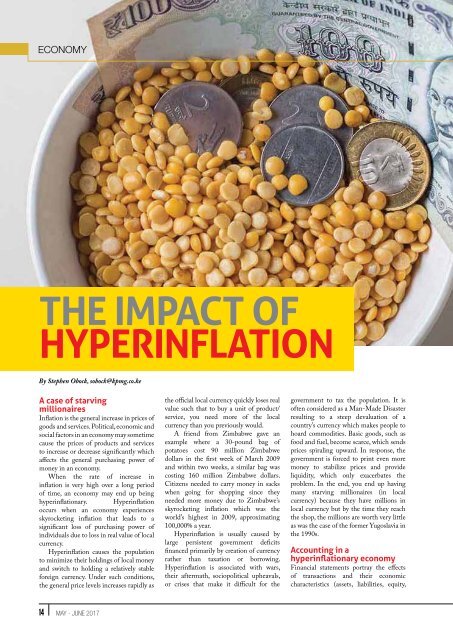The Accountant-May-June 2017
Create successful ePaper yourself
Turn your PDF publications into a flip-book with our unique Google optimized e-Paper software.
Economy<br />
THE IMPACT OF<br />
HYPERINFLATION<br />
By Stephen Obock, sobock@kpmg.co.ke<br />
A case of starving<br />
millionaires<br />
Inflation is the general increase in prices of<br />
goods and services. Political, economic and<br />
social factors in an economy may sometime<br />
cause the prices of products and services<br />
to increase or decrease significantly which<br />
affects the general purchasing power of<br />
money in an economy.<br />
When the rate of increase in<br />
inflation is very high over a long period<br />
of time, an economy may end up being<br />
hyperinflationary. Hyperinflation<br />
occurs when an economy experiences<br />
skyrocketing inflation that leads to a<br />
significant loss of purchasing power of<br />
individuals due to loss in real value of local<br />
currency.<br />
Hyperinflation causes the population<br />
to minimize their holdings of local money<br />
and switch to holding a relatively stable<br />
foreign currency. Under such conditions,<br />
the general price levels increases rapidly as<br />
the official local currency quickly loses real<br />
value such that to buy a unit of product/<br />
service, you need more of the local<br />
currency than you previously would.<br />
A friend from Zimbabwe gave an<br />
example where a 30-pound bag of<br />
potatoes cost 90 million Zimbabwe<br />
dollars in the first week of March 2009<br />
and within two weeks, a similar bag was<br />
costing 160 million Zimbabwe dollars.<br />
Citizens needed to carry money in sacks<br />
when going for shopping since they<br />
needed more money due to Zimbabwe’s<br />
skyrocketing inflation which was the<br />
world’s highest in 2009, approximating<br />
100,000% a year.<br />
Hyperinflation is usually caused by<br />
large persistent government deficits<br />
financed primarily by creation of currency<br />
rather than taxation or borrowing.<br />
Hyperinflation is associated with wars,<br />
their aftermath, sociopolitical upheavals,<br />
or crises that make it difficult for the<br />
government to tax the population. It is<br />
often considered as a Man-Made Disaster<br />
resulting to a steep devaluation of a<br />
country’s currency which makes people to<br />
hoard commodities. Basic goods, such as<br />
food and fuel, become scarce, which sends<br />
prices spiraling upward. In response, the<br />
government is forced to print even more<br />
money to stabilize prices and provide<br />
liquidity, which only exacerbates the<br />
problem. In the end, you end up having<br />
many starving millionaires (in local<br />
currency) because they have millions in<br />
local currency but by the time they reach<br />
the shop, the millions are worth very little<br />
as was the case of the former Yugoslavia in<br />
the 1990s.<br />
Accounting in a<br />
hyperinflationary economy<br />
Financial statements portray the effects<br />
of transactions and their economic<br />
characteristics (assets, liabilities, equity,<br />
14 MAY - JUNE <strong>2017</strong>

















